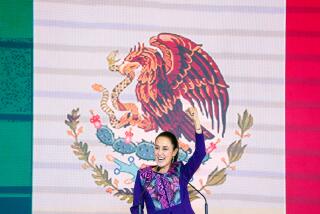Argentina’s next leader faces unease
- Share via
BUENOS AIRES — She cruised to presidential victory on the successful economic policies of her husband, President Nestor Kirchner, who delivered four years of brisk growth in the aftermath of a national financial and political breakdown.
But First Lady Cristina Fernandez de Kirchner, whose election was confirmed by near-final results Monday, faces serious challenges as she prepares to take office for a four-year term Dec. 10 as Argentina’s first elected female chief of state.
“The president-elect won’t have a honeymoon,” Fernando Gonzalez wrote in the daily Clarin. “It is well known that Argentina is cruel with success.”
Beyond the return to prosperity so evident in this bustling capital, analysts cite a sobering reality: rising inflation, a looming energy crisis and a likely slowdown in an economy tied to a brisk export market.
Many Argentines, inherently distrustful of their leaders, suspect an economic bust is on the horizon. Voters, especially middle-class urban residents, expressed concern about the country’s long-term economic health and worries about a prospective Kirchner dynasty. “It’s really terrifying how much prices are rising.” said Constanza Cella, 38, a capital resident who voted against Fernandez.
Though Fernandez boasted of the wide margin of her victory, official results showed that she received about 45% of the overall vote, despite enjoying the benefits of her husband’s incumbency and the Peronist political machine he now heads. That was good enough for a 22-point margin over her nearest rival in a fragmented field of opposition candidates. But Fernandez lost the city of Buenos Aires and other urban areas. Cabinet Chief Alberto Fernandez told Argentine radio that the urban middle classes had succumbed to what he called the false impression of “an intolerant, inflexible Cristina . . . incapable of maintaining dialogue.” It is an image of a hectoring, authoritarian-inclined administration that has dogged the president and his wife. In her victory speech, Fernandez seemed intent on showing another side.
The president-elect called for political reconciliation “without rancor, without hatred,” declaring, “It’s time to reconstruct the social and institutional fabric” of Argentina. Her comments were taken as a sign she recognizes the need to be more flexible than her famously stubborn husband.
Along with recognizing national divisions, the president-elect seems acutely aware that Argentina’s economic well-being could be on tenuous ground.
Though Fernandez did little campaigning, in recent months she cozied up to corporate investors who have felt slighted by her husband’s seeming indifference to their role in the economy. She met with financiers from Buenos Aires to New York to Madrid, assuring them that Argentina would be open for business.
Fernandez also faces challenges on the diplomatic front, a weak point for her husband, who was reported to be uncomfortable on foreign trips. She, by contrast, seems to revel in them.
“As far as the future economic scenario is concerned, a lot of people think that Cristina will be much more pragmatic than her husband,” said Sergio Berensztein, a political analyst. “She will likely look for more foreign investment and better relations with the rest of the world, while working to solve the problems of energy and public services.”
--
Andres D’Alessandro of The Times’ Buenos Aires Bureau contributed to this report.
More to Read
Sign up for Essential California
The most important California stories and recommendations in your inbox every morning.
You may occasionally receive promotional content from the Los Angeles Times.










